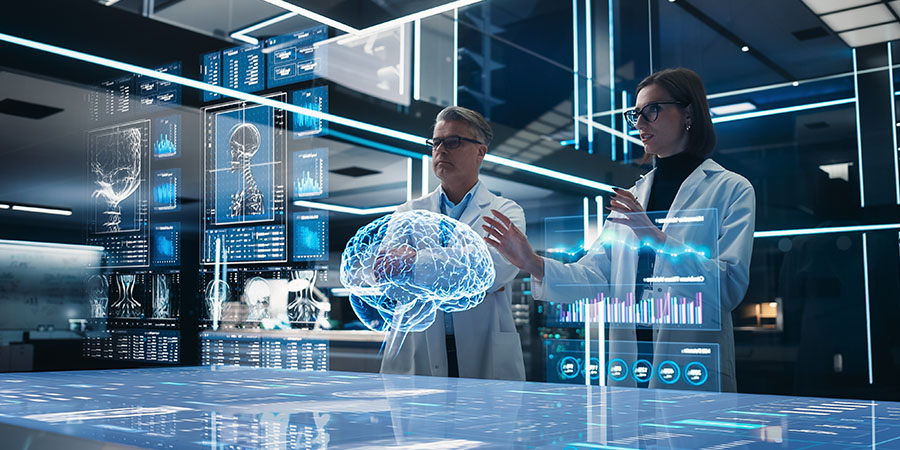In the 21st century, two of the most transformative fields—biotechnology and computing—are converging to unlock new possibilities for humanity.
While biotechnology reshapes our understanding of life sciences and medicine, computing powers the tools that allow us to process vast amounts of biological data and simulate complex systems.
Together, they are driving a revolution with the potential to change health, industry, and society.
Interesting Read: Managing Data in the Internet of Bodies Era: Challenges and Opportunities
The Fusion of Biology and Technology
Biotechnology has already proven its value through groundbreaking innovations such as gene editing with CRISPR, synthetic biology, and personalized medicine. Meanwhile, computing continues to evolve, fueled by advances in artificial intelligence (AI), high-performance computing (HPC), and quantum technologies.
The intersection of these fields allows researchers to analyze DNA sequences at unprecedented speed, design synthetic organisms with precision, and predict the behavior of biological systems before they unfold in reality.
A powerful example of this synergy is AI-driven drug discovery. Traditional drug development can take over a decade and billions of dollars, with many promising compounds failing in clinical trials. By combining biotechnology and computational modeling, researchers can now simulate molecular interactions and screen thousands of compounds in silico. This accelerates the identification of viable drug candidates, reduces costs, and increases the probability of success.
Read More: The Synergy Between 5G and Cellular IoT: Unlocking Connectivity Potential
Personalized and Predictive Healthcare
One of the most exciting outcomes of this convergence is the rise of personalized healthcare. By sequencing a patient’s genome and integrating it with medical history, lifestyle factors, and real-time data from wearable devices, healthcare providers can deliver highly tailored treatments. Computing power enables the processing of this enormous data volume, while biotechnology makes it actionable through targeted therapies.
For example, in oncology, computational models help predict which treatments are most effective against a patient’s specific tumor profile. Immunotherapies, which harness the body’s immune system to fight cancer, are being enhanced by machine learning (ML) algorithms that analyze biomarkers and forecast treatment responses. The result is a shift from reactive medicine to proactive, preventive care, one that prioritizes health outcomes and efficiency.
In Cape Town, South Africa, a pediatric drug-resistant epilepsy study combined genetic testing with mHealth apps and wearables to track seizures, sleep, and mobility, producing more accurate treatment responses than clinical records alone. On a continental scale, the Roche African Genomics Program is sequencing more than 50,000 African genomes, building biobanks and infrastructure that will underpin tailored healthcare, and the Africa CDC’s Pathogen Genomics Initiative (PGI) is expanding genomic surveillance and diagnostics capacity.
Discover More: AI Revolution in Africa: Opportunities and Pathways Forward
Beyond Medicine: Industry and Agriculture
The impact of biotechnology and computing extends beyond healthcare. In agriculture, computational biology is being used to design crops that are more resilient to climate change, pests, and diseases. By modeling plant genomes and environmental interactions, scientists can develop sustainable farming practices and reduce dependence on chemical pesticides.
The African Orphan Crops Consortium (AOCC), working with the World Agroforestry Centre (ICRAF), has sequenced the genomes of more than 100 indigenous crops, aiming to boost nutrition and resistance in varieties often overlooked by global agribusiness. Researchers at the Biosciences eastern and central Africa–International Livestock Research Institute Hub, known as the BecA-ILRI Hub, and the John Innes Center are applying bioinformatics and molecular breeding to grass peas and wheat, while South Africa’s Agricultural Research Council (ARC) is leveraging computational biology to design climate-resilient wheat and grape varieties.
In industrial biotechnology, microbes are being engineered to produce biofuels, biodegradable plastics, and other eco-friendly materials. Computational tools allow researchers to design and optimize these organisms faster, making biomanufacturing more cost-effective and scalable. Innovatively, Nigeria’s NABDA is supporting microbial platforms for bioethanol and biodiesel production from cassava and sugarcane residues. This not only supports the transition to a circular economy but also reduces environmental footprints.
The Role of Big Data and AI
At the heart of this convergence lies data. The human genome alone consists of over three billion base pairs, and when multiplied across populations, the data quickly becomes astronomical. Advanced computing infrastructures, including cloud platforms and supercomputers, provide the necessary capacity to process and analyze this information.
AI plays a pivotal role by identifying patterns invisible to human researchers. For instance, machine learning models can detect subtle genetic variations linked to rare diseases or predict protein folding structures, a challenge that has baffled scientists for decades. Breakthroughs like Google DeepMind’s AlphaFold, which demonstrated the power of AI in decoding protein structures, exemplify the potential of this new era.
Related: The Quintet of Emerging Trends Shaping the Future of Data Storage
Ethical Considerations
Despite the promise, the convergence of biotechnology and computing raises critical ethical and societal questions. Issues around data privacy, genetic manipulation, and equitable access to these technologies must be carefully managed. Additionally, as biocomputing capabilities grow, so does the potential for unintended consequences, such as engineered pathogens or unforeseen ecological disruptions. International collaboration and regulation will be essential to ensure responsible innovation.
Balancing progress and oversight will determine whether this revolution benefits humanity as a whole or exacerbates existing inequalities.
The fusion of biotechnology and computing is not a distant vision; it is already reshaping industries and redefining possibilities. As research accelerates, the next decade could bring breakthroughs such as fully personalized therapies, climate-resilient agriculture, and sustainable biomanufacturing on a global scale.
Ultimately, this convergence represents the reimagining of the relationship between humans, machines, and nature. By harnessing the strengths of both biotechnology and computing, we stand at the threshold of a new era, one where innovation has the potential to improve lives, protect the planet, and unlock the mysteries of life itself.

